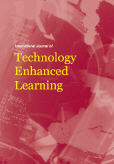
International Journal of Technology Enhanced Learning
Scope & Guideline
Advancing the Future of Learning through Technology
Introduction
Aims and Scopes
- Integration of Technology in Education:
This encompasses research on how various technologies, such as online learning platforms, interactive software, and mobile applications, are incorporated into educational settings to enhance teaching and learning processes. - Pedagogical Innovations:
The journal highlights studies that introduce new teaching methodologies, including gamification, flipped classrooms, and project-based learning, aimed at improving student engagement and learning outcomes. - Impact of Digital Tools on Learning:
Research focusing on the effectiveness of digital tools and resources in facilitating learning, assessing their influence on student performance, motivation, and overall educational experiences. - Educational Equity and Inclusion:
Exploring strategies and models that promote digital inclusion and equitable access to technology in educational contexts, particularly in underserved or marginalized communities. - Assessment and Evaluation in Digital Learning:
This includes research on innovative assessment methods, such as digital assessments and feedback mechanisms, that align with modern educational practices and technology.
Trending and Emerging
- Gamification and Game-Based Learning:
There is a notable increase in research focusing on gamification strategies and game-based learning approaches, emphasizing their effectiveness in enhancing student engagement, motivation, and learning outcomes. - Digital Literacy and Competencies:
Emerging studies are increasingly addressing the need for digital literacy and competencies among students and educators, aligning with global educational standards and initiatives such as the Sustainable Development Goals (SDGs). - Impact of COVID-19 on Education:
The pandemic has catalyzed a surge in research analyzing the impact of COVID-19 on teaching and learning practices, including the transition to online learning, student experiences, and the role of technology in mitigating challenges. - Use of Artificial Intelligence and Data Analytics:
Recent publications are exploring the integration of AI and data analytics in education, focusing on personalized learning experiences, predictive analytics for student performance, and intelligent tutoring systems. - Interdisciplinary Approaches to Education:
There is an increasing trend towards interdisciplinary research that combines technology with various fields, such as STEAM (science, technology, engineering, arts, and mathematics) education, to foster creativity and innovation.
Declining or Waning
- Traditional Face-to-Face Learning Models:
Research centered around conventional in-person teaching methods is becoming less common, overshadowed by the growing emphasis on online and blended learning approaches. - Basic Technology Adoption Studies:
Earlier studies that primarily focused on the initial adoption of technology in educational settings are declining as the field progresses towards more complex analyses of technology integration and its impacts. - Narrow Focus on Specific Technologies:
There is a noticeable shift away from studies that concentrate solely on specific technologies (e.g., single software tools) to broader investigations of holistic educational environments and comprehensive technology ecosystems. - General Attitudes Towards Technology in Education:
Research focusing on general perceptions and attitudes towards technology use in education is waning in favor of more nuanced explorations of specific applications, methodologies, and outcomes. - Static Learning Environments:
Studies that examine static or unchanging learning environments without considering the dynamic nature of technology-enhanced learning are becoming less relevant.
Similar Journals
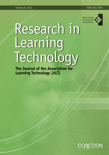
Research in Learning Technology
Fostering Global Collaboration in Learning Technology ResearchResearch in Learning Technology, published by the Association for Learning Technology (ALT)impact factor, the journal has consistently ranked in the top quartiles of both the Education (Q1) and Computer Science Applications (Q2) categories as of 2023, highlighting its significance and influence in the academic community. The journal is committed to disseminating high-quality research and practical insights that bridge the gap between technology and pedagogy, making it an essential resource for researchers, educators, and practitioners alike. The Scopus rankings further emphasize its reputation, placing it in the top 10% of social sciences education journals. As an open-access journal, Research in Learning Technology ensures that its valuable content is freely accessible, empowering a global audience to drive innovation in learning technology. Whether you are a seasoned researcher or a student exploring this dynamic field, this journal serves as a vital platform for sharing knowledge and advancing the discourse in learning technologies.

Research and Practice in Technology Enhanced Learning
Shaping the future of learning through open-access research.Research and Practice in Technology Enhanced Learning is a leading international journal dedicated to advancing the field of educational technology and its applications in various learning environments. Published in Taiwan, this journal has firmly established itself as an open-access platform for sharing innovative research, practical insights, and emerging trends since its inception in 2015. With an impressive Q1 ranking in Education and Media Technology for 2023, coupled with notable placements in the fields of Social Psychology and Management of Technology and Innovation, the journal underscores its significance in fostering interdisciplinary collaboration among scholars and practitioners. Its rigorous peer-review process ensures the publication of high-quality articles that contribute substantively to both theoretical and practical knowledge. The journal's commitment to open access enhances its visibility and accessibility, making it an invaluable resource for researchers, educators, and students seeking to explore the intersection of technology and learning.
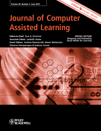
JOURNAL OF COMPUTER ASSISTED LEARNING
Empowering Education Through TechnologyWelcome to the JOURNAL OF COMPUTER ASSISTED LEARNING, a premier publication dedicated to the advancement of research in the fields of computer science applications, education, and e-learning. Published by WILEY, this journal has earned a prestigious reputation, holding a Q1 quartile ranking in both its primary categories for the year 2023. With its extensive reach since its inception in 1985, it features cutting-edge research that stimulates innovative practices in educational technology and pedagogical methods. Recognized for its impact with a remarkable Scopus ranking — 57th in Social Sciences/Education and 105th in Computer Science — the journal is a vital resource for scholars, educators, and practitioners looking to deepen their understanding of how technology enhances learning experiences. Although the journal is not open access, its commitment to quality research continues to resonate across the UK and globally, making it an essential platform for those engaged in enhancing educational outcomes through technology.

Education and Information Technologies
Empowering learning with innovative insights.Education and Information Technologies, published by SPRINGER, is a leading journal dedicated to the intersection of educational practices and innovative information technologies. With an impressive impact factor and consistently ranked in the Q1 quartile across Education, E-learning, and Library and Information Sciences, this journal serves as an essential resource for researchers and professionals aiming to explore the dynamic landscape of educational technology. Spanning from 1996 to 2024, it provides a platform for high-quality, peer-reviewed articles that contribute to the evolving discourse in this critical field. The journal’s rigorous Scopus ranking, placing it in the top 4% of Social Sciences Education and top 6% in Library and Information Sciences, highlights its significance in advancing scholarly knowledge. While it offers various access options, the focus remains on delivering cutting-edge research that can inform teaching practices and technological integration in education, making it indispensable for students, educators, and technology developers alike.

Computers and Education Open
Advancing educational excellence through technology.Computers and Education Open is a pioneering open access journal published by Elsevier that focuses on advancing the field of educational technology and digital learning methodologies. Since its inception in 2020, the journal has provided a platform for researchers, educators, and practitioners to disseminate innovative findings and share insights related to the integration of computing technologies in educational settings. With its ISSN 2666-5573, this journal aims to bridge the gap between technology and education, fostering a collaborative environment for those dedicated to enhancing learning experiences through computational tools. Leveraging the rigorous standards of Elsevier's publishing excellence, Computers and Education Open attracts high-quality research that influences pedagogical practices and educational policies globally. The open access nature of the journal ensures that valuable knowledge is freely accessible, making it an essential resource for academics and professionals looking to stay at the forefront of educational advancements.

Eurasian Journal of Educational Research
Advancing educational excellence across Eurasia.The Eurasian Journal of Educational Research, published by ANI YAYINCILIK, is a distinguished platform dedicated to advancing the field of education since its inception in 2008. Operating under a robust commitment to open access principles, this journal facilitates the dissemination of high-quality research and innovative practices across diverse educational domains. With an ISSN of 1302-597X and an E-ISSN of 2528-8911, it serves as a significant resource for educators, researchers, and policymakers within the academic community. Holding a Q3 rating in Education for the year 2023, and ranked 792 out of 1543 within the Scopus database, the journal exemplifies its commitment to enhancing educational outcomes across Eurasia. The Eurasian Journal of Educational Research aims to publish original research, systematic reviews, and insightful perspectives that contribute to the ongoing discourse in educational research, policy, and practice. Based in Ankara, Turkey, it also emphasizes the importance of regional studies and their implications on global educational trends, thus enriching the academic landscape with localized knowledge while fostering international collaborative networks.

Technology Pedagogy and Education
Pioneering Research for Tomorrow's Learning EnvironmentsTechnology Pedagogy and Education, published by Routledge Journals, Taylor & Francis Ltd, is a leading academic journal focused on the intersection of technology and educational practices. With an impact factor reflecting its significant contribution to the field, this journal provides a critical platform for disseminating innovative research and emerging trends in technology-enhanced learning. Serving as a resourceful hub since its inception in 2003, it has established itself in the top quartile of various categories, including Communication, Computer Science Applications, Education, and Information Systems. Researchers and educators alike will find the journal's insights invaluable as they navigate the ever-evolving landscape of educational technology. Although it does not currently offer open access options, its rigorous peer-review process ensures that only the highest quality research is published, making it essential reading for anyone invested in the educational sector.
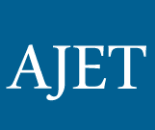
Australasian Journal of Educational Technology
Pioneering Research for a Digital Learning RevolutionAustralasian Journal of Educational Technology (AJET), a premier peer-reviewed journal published by the Australasian Society for Computers in Learning in Tertiary Education (ASCILITE), has been at the forefront of advancements in educational technology since its inception in 1985. With an impressive Q1 ranking in both Education and E-learning categories for 2023, this open access journal (ISSN: 1449-3098, E-ISSN: 1449-5554) serves as a vital platform for researchers, practitioners, and students aiming to disseminate innovative research and practices in the use of technology for teaching and learning in tertiary education. Based in Australia and accessible to a global audience, AJET is committed to enhancing educational outcomes through the integration of technology, fostering a vibrant community of scholarship and collaboration among educators and industry professionals. With its high impact ranking (Rank #105/1543 in Social Sciences - Education), AJET remains a significant contributor to the scholarly discussion on effective learning environments in an increasingly digital world.
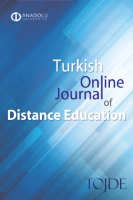
Turkish Online Journal of Distance Education
Advancing Innovations in Online Education.Turkish Online Journal of Distance Education, a distinguished publication from ANADOLU UNIVERSITY, serves as a vital resource in the field of distance education, contributing significantly to the ongoing discourse since its inception in 2000. With an impressive impact factor that reflects its standing within the academic community, this open access journal provides an influential platform for researchers, educators, and practitioners to disseminate innovative findings and educational strategies. Ranked in the Q2 category within the education sector according to the 2023 quartile rankings, and boasting a commendable position of #423 out of 1543 in Scopus' Social Sciences Education rankings, the journal places itself firmly within the 72nd percentile of its cohort. Spanning from 2004 to 2024, the journal's commitment to advancing scholarship in distance education is reflected not only in its comprehensive articles but also in its responsive engagement with contemporary educational challenges. Positioned in Eskişehir, Turkey, this journal aims to elevate discussions surrounding online learning and contributes to the global dialogue on education accessibility and innovation.

Journal of University Teaching and Learning Practice
Transforming Higher Education Through Innovative ScholarshipWelcome to the Journal of University Teaching and Learning Practice, a premier publication dedicated to advancing research and practice in higher education. Published by UNIV WOLLONGONG, this journal provides a vital platform for educators, researchers, and practitioners to explore innovative teaching methodologies and learning strategies to enhance the university experience. With an impressive impact factor and categorized in the Q2 quartile for Education in 2023, this journal ranks in the top percentile of educational research, boasting a Scopus rank of 437 out of 1543 in Social Sciences Education. Since its inception in 2016, the journal has become a significant contributor to the field, fostering a scholarly dialogue among scholars from around the globe. Although currently not operating under an Open Access model, it offers valuable insights and is committed to publishing high-quality research that reflects best practices in educational settings. Join our community of academics dedicated to transforming university teaching and learning through rigorous scholarship and innovative practices.